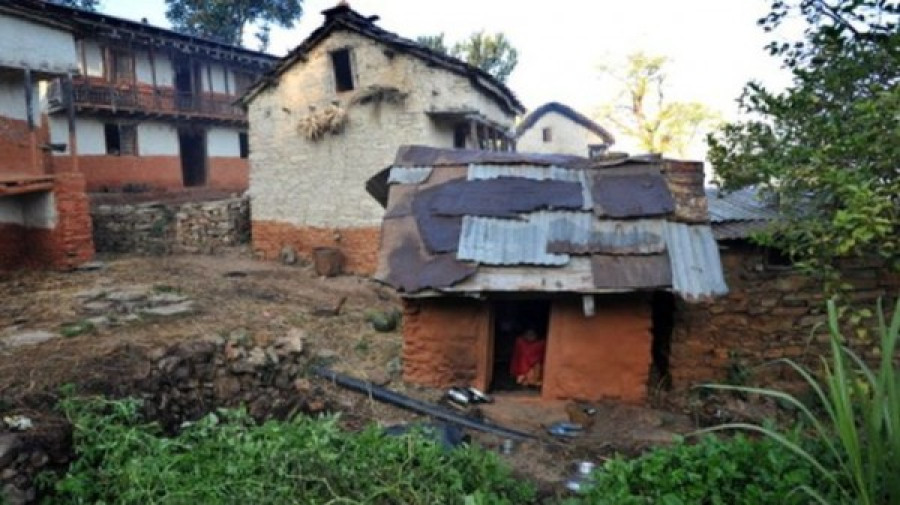Opinion
Ending bad blood
Criminalising the practice of Chhaupadi is a milestone in Nepali women’s fight against patriarchy
Supriya Gurung
On Wednesday, Parliament enacted a new law criminalising the age-old custom of Chhaupadi. This singular act marks a historical departure from the traditional nature of Nepal’s legal system; it strikes me as being particularly emblematic of the changing tide for Nepali women.
Chhaupadi is a deeply entrenched social tradition dictating that menstruating women, and those who have just given birth are impure and should therefore be isolated in makeshift huts or sheds. Just last month, a woman who was observing Chhaupadi died of a snakebite. And in December 2016, a 15-year-old girl in Achham who was banished to a poorly ventilated shed suffocated to death. Like all other Nepali women, I go through a range of emotions—frustration, sadness and anger—each time such an appalling incident takes place.
Unsurprisingly, these incidents have also made global headlines.
The Guardian released a piece aptly titled ‘Nepal’s bleeding shame’, and the New York Times has issued a slew of articles that has pushed the issue of Chhaupadi into the international spotlight. But most of the credit for waking up our otherwise hidebound political party leaders should go to local media—national and local newspapers, TV stations and community radio stations—and community organisations who have tirelessly highlighted the ills of a deeply traditional and patriarchal society. As an educated Nepali woman, who continually witnesses gender discrimination perpetuated by our societal structure, I am happy to witness what I consider to be a monumental change that was long overdue.
Chhaupadi may be particularly common in Mid- and Far-western Nepal, but taboos surrounding menstruation persist even amongst the urban educated class, where I belong. Studies show that amongst residents of the Capital, a majority of women observe menstrual restrictions and exclusionary practices despite being aware that menstruation is a normal and natural biological process. This highlights the colossal impact the long-standing tradition and societal pressure has on us.
How is it that menstruation—a natural physiological cycle—has been stigmatised as being impure? It seems that dogmatic interpretations of the religious scripts have inculcated this mistaken belief that menstruation be regarded a taboo, fuelling the perception that disobeying the diktats could bring death and destruction to families.
Chhaupadi decrees that women be confined to small, dark spaces without nutritious food or adequate protection from the elements; this at a time when they need them the most. Pushed out of their homes for days, this practice makes menstruating women also vulnerable to wildlife attacks and sexual assaults, and further adds to higher maternal and infant mortality rates.
These practices persist despite the Supreme Court’s ruling in 2005 declaring Chhaupadi to be a malpractice, followed by the Chhaupadi Pratha Elimination Directive of 2008. It is clear that neither the ruling nor the directive was adequately enforced.
According to the new law which is pegged to come into effect in a year, a three-month jail sentence or a Rs3,000 fine, or both, will be levelled on anyone who forces a woman to follow the custom of Chhaupadi—thereby making those who violate the law legally accountable.
Activists are applauding the new ruling; Mohna Ansari, a member of the national human rights commission told Al Jazeera, “The law gives an open space for women to come forward if they are forced to follow the practice.” Criminalising Chhaupadi is a definite victory for the multitude of Nepali women who are forced, by traditions and social pressure, to mould themselves to a societally acceptable standard. Yet it’s only the beginning.
The ruling alone will not change the prevalent mind-set. Eradicating the practice of Chhaupadi or ending the practice of declaring vulnerable women to be witches are not things that can be accomplished with the simple stroke of the law.
The root cause behind the stigma must be ascertained so that appropriate interventions can be formulated. Leaders in society, be they school teachers, religious leaders, or politicians must take a stand and raise awareness and advocacy to destigmatise menstruation. For example, when the news broke about the criminalisation of Chhaupadi, I expected Prime Minister Sher Bahadur Deuba to have at least something to say about this historic development. But what was revealed to me was that, while PM Deuba could wax eloquent about generic policies to address gender discrimination, he would rather tweet about chairing an annual senate meeting of Far-Western University than mention this huge step forward for Nepali women. I hoped that this would be an issue particularly close to his heart, as he himself comes from the far-west region himself.




 9.7°C Kathmandu
9.7°C Kathmandu










